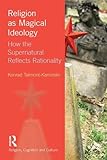Religion as magical ideology : how the supernatural reflects rationality / Konrad Talmont-Kaminski.
Material type: TextSeries: Religion, Cognition and CulturePublisher: London : Routledge, 2014Description: 1 online resourceContent type:
TextSeries: Religion, Cognition and CulturePublisher: London : Routledge, 2014Description: 1 online resourceContent type: - 9781317544739
- 1317544730
- 9781317544746
- 1317544749
- 9781317544722
- 1317544722
- 200.19 23
- BF175.4.R44 T35 2014
- online - EBSCO
| Item type | Current library | Call number | URL | Status | Notes | Barcode | |
|---|---|---|---|---|---|---|---|
 eBook
eBook
|
Biblioteca "Angelicum" Pont. Univ. S.Tommaso d'Aquino Nuvola online | online - EBSCO (Browse shelf(Opens below)) | Online access | Not for loan (Accesso limitato) | Accesso per gli utenti autorizzati / Access for authorized users | (ebsco)877451 |
CIP data; resource not viewed.
1. Introduction -- 2. Superstitious reeds -- 3. The superempirical -- 4. Magic as cognitive by-product -- 5. Religion as magical ideology -- 6. Religion as ancestral trait.
'Religion as Magical Ideology' examines the relationship between rationality and supernatural beliefs arguing that such beliefs are products of evolution, cognition and culture. The book does not offer a false rapprochement between reason and religion; instead, it explores their interrelationship as a series of complex adaptations between cognitive and cultural processes. Exploring the nature of the tension between religious traditions and reason, 'Religion as Magical Ideology' develops a dual inheritance theory of religion - which combines the cognitive byproduct and prosocial adaptation acco.


